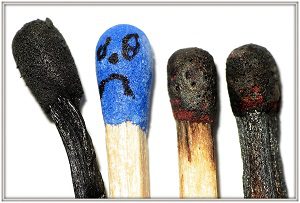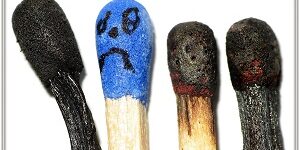Chloe Thompson, MLS(ASCP)CM
 |
| The symptoms of burnout range from increased cynicism and decreased ability to concentrate on our tasks at hand to disrupted sleep, headaches, and other physical symptoms. Photo credit: Rolf Dietrich Brecher |
Burnout. We all know the feeling—where work has somehow infiltrated every aspect of life, how stress is amplified, and there never seems to be a light at the end of the tunnel. We forget why we got into this field of healthcare and medical laboratory work in the first place and feel disconnected and demotivated. It’s not a fun place to be, and it seems to be becoming more and more prevalent throughout the laboratory.
Burnout is defined as fatigue, frustration, or apathy resulting from prolonged stress, overwork, or intense activity, per Dictionary.com. The symptoms of burnout range far and wide—from increased cynicism and decreased ability to concentrate on our tasks at hand to disrupted sleep, headaches, and other physical symptoms, according to an article from Mayo Clinic.1 In addition to affecting the mental, emotional, and even physical health of healthcare professionals themselves, burnout will inevitably affect those we care for: our patients.
Burnout in Healthcare
Did you know, that when you Google “burnout statistics for healthcare,” physicians and nurses are frequently mentioned or specified; however, in the first 15 pages of a Google or Google Scholar search, the laboratory is not mentioned even once? The search term “biomedical” was also included to encompass our biomedical scientist counterparts in the United Kingdom, and the term only appeared once—in the title of a presenter. Even in an article titled “Burnout in United States Healthcare Professionals: A Narrative Review,”2 only statistics for nurses and physicians are provided. The conversation regarding how widespread burnout is in the collective healthcare profession umbrella has started but hasn’t yet spread to include the laboratory.
| Editorial Note: At the time of publication, the American Journal of Clinical Pathology released a major study from the ASCP Institute for Science, Technology and Public Policy that studies job satisfaction, burnout and wellness among more than 4,600 laboratory professional respondents. Read the study. |
All of the symptoms of burnout seem intimately familiar to working in healthcare, particularly in hospital settings. Fatigue from endless paperwork, far past the standard of “if you didn’t document it, it didn’t happen,” or from working extra shifts to cover for being short-staffed. Frustration from having to endlessly defend our patients to insurance companies, sample requirements to those collecting them on the floor, decision-making rationale to others. From juggling equipment calibration, quality control, and calling critical results all while the LIS is on scheduled downtime, we know that the laboratory is the silent backbone of healthcare, generating the information required for diagnoses and to determine treatment paths for doctors, nurses, and patients to embark on.
Burnout in the Laboratory
When we first arrived in this profession, most of us ran into the ever-present situation of our friends and family members not knowing our job existed, or what we do as clinical laboratory scientists. As we’ve educated those around us, most people realize that they have had an interaction with the clinical laboratory at some point in their lives, if not at many points. We know that we are an important and key part of patient care—yet it can be easy to forget this as we rarely have contact with those whose lives we impact.
According to “Burnout in United States Healthcare Professionals: A Narrative Review,” burnout in physician population is caused largely in part by bureaucratic tasks and too much time at work2, and similar issues plague the laboratory as well. As the number of MT/MLS/CLS programs in the country dwindle down, laboratories consistently find themselves short staffed, with erratic hours to cover call outs or to compensate for broken or improper testing equipment.
The laboratory’s Twitter presence has grown tremendously in the past few years, and a few months ago I tweeted about burnout in the laboratory, asking why it isn’t talked about more. Twitter indeed responded. Feedback from my peers across the country suggests that some of the biggest issues in our field are lack of effective equipment, erratic and inconsistent scheduling, and lack of encouragement from our superiors. However, the thing that caused laboratory professionals to feel the most strongly burnt out and discouraged by was disrespectful attitude towards the lab—from nurses, doctors, and even patients (especially if phlebotomy is part of the responsibility list). Some have described phone calls from the floor as attacks and blame games. Feeling like you need to keep a defense up against your colleagues is one of the biggest discouragements that can be experienced in the workplace and can have you ready to walk out the door without looking back.
How Do We Handle It?
While many causes of burnout reflect the fallacies of our healthcare system, we need to do what we can to cope. Getting space from workplace stress is important in making sure that we are able to give our best to our work as well as our personal lives. While not all of us can up and take a vacation, taking time to enjoy hobbies and life outside of work is key to combating the stress and apathy from burnout.
Hearing a “thank you” or being on the receiving end of a small gesture of appreciation can lift spirits even on some of the worst workdays. I can’t pretend to have all the answers on how to solve the problem of burnout; however, I can point out patterns I notice and hope that it is addressed as more and more people recognize it to be a problem.
The biggest takeaway I can offer at this point, to both seasoned veterans and newcomers to this unique, quintessential field of healthcare: be kind. Be kind to each other, be kind to your colleagues, be kind to your supervisors. Doctors and nurses, be kind. We are all on the same team. Be kind to yourselves—remember that you are an important piece of the puzzle, even if it doesn’t always feel like it. We need to encourage and lift each other up rather than tear each other down—our field is a wonderous, amazing, and fantastic one. I hope more and more people discover that, and that we are all continuously reminded of it.
References
- Mayo Clinic Staff. (2018, November 21). Know the signs of job burnout.
- Reith, T. P. (2018). Burnout in United States Healthcare Professionals: A Narrative Review. Cureus. doi: 10.7759/cureus.3681
Chloe Thompson is a medical technologist for Blood Bank of Delmarva, Inc., in Newark, Delaware.
